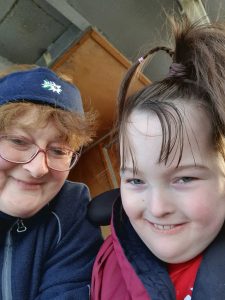Article from 2020/2021 Auxiliaries Annual Report
Rose Pickard loves parties, a particular pastime we’re all nostalgic for in 2021. Rose will be celebrating her 10th birthday soon, and mum Kate Breuer is determined to plan the perfect party – she’s thinking roller skating!
Rose has severe cerebral palsy and relies on her wheelchair to get around, but despite not being able to walk and struggling with movement, she loves music, dancing, singing, and absolutely anything with colour.
“Last year we celebrated Rose’s birthday with a joint disco party for Rose and a friend from school, and she loved the action,” said Kate.
Roller skating might sound impossible for someone in a wheelchair, but Rose’s family doesn’t believe in impossible. They’re committed to celebrating her 10th birthday in the most fun way possible.
“So, if we can get a carer to help push Rose around, I think she would really like roller skating, and being involved.”
Rose was born early, at 25 weeks, after a challenging pregnancy for Kate.
“Rose was our first IVF attempt; I could get pregnant but couldn’t stay pregnant, so when Rose was born at 25 weeks, it wasn’t a huge shock for us,” said Kate.
Rose spent her first 12 weeks of life in the Neonatal Intensive Care Unit (NICU) and a further 13 weeks in the special care nursery. She was diagnosed with cerebral palsy shortly after.
“The doctors had spoken to my husband Richard and I about Rose having a right-hand bias which is an indication of cerebral palsy, and then they did an MRI which confirmed the diagnosis,” said Kate.
“I went through a process of thinking, it’ll be mild cerebral palsy, no, it’ll be moderate – no its severe.”
Rose requires a wheelchair and has significant challenges accomplishing daily activities. She has two carers who help Kate and Richard with meal times, changing and lifting Rose into the shower, or into her bed.
Kate and Richard are committed to giving Rose the best childhood possible, and whenever they can, they love to eat out as a family on weekends or get away on a family trip – their most recent being to Lakes Entrance with Kate’s sister Astrid.

Rose with her mum, Kate.
“We would love to do more, we go to cafes on weekends and when we get help and can get accessible accommodation, we go away, which Rose really loves,” said Kate.
Rose attends appointments at the RCH three times a year with paediatrician Dr Monica Cooper, who is part of an expert team using world-leading practices to support children with cerebral palsy. Each visit, Rose is supported through a series of check-ups and specialised care appointments to support her development, including hip X-rays, kidney ultrasounds, and most recently, treatment for a dislocated shoulder. Eventually Rose will need to undergo surgery to help with movement of her limbs.
The Victorian Cerebral Palsy Register Project, supported by Trailblazers and Special Kids EBC Auxiliary, is helping to change outcomes for cerebral palsy patients, and is a project that the Pickard’s are heavily invested in. Rose is enrolled as a patient, and Kate is also involved as a member of the Advisory Committee for the register, which discusses upcoming research projects and research findings.
“Rose has been involved with the register since shortly after birth and I’ve done a number of surveys for the register which look at things like optimal care, inclusion and Rose’s experience either with cerebral palsy or the hospital,” said Kate.
“I wanted to be a part of the register as research is so important and the work of the register is so vital. I am very happy to support their work however I can.”
The Victorian Cerebral Palsy Register Project collects information on people with cerebral palsy, born or living in Victoria since 1970. Researchers aim to identify factors that appear to increase or reduce the risk of cerebral palsy. The register also allows researchers to undertake large trials and research projects to investigate the effectiveness of various treatments and understand how children with cerebral palsy change as they get older.
Despite her physical limitations, Rose loves getting involved when she can and socialising.
“She enjoys school and chatting to people, within her limitations. Everybody who meets Rose thinks she’s gorgeous and lovely. She makes you smile; she has a great sense of humour,” said Kate.
“While she is behind her peers with learning and vocabulary, she is slowly improving. She will come out with a new sentence and she’ll surprise us and I think ‘wow’, she’ll do it slowly, in her own time.”